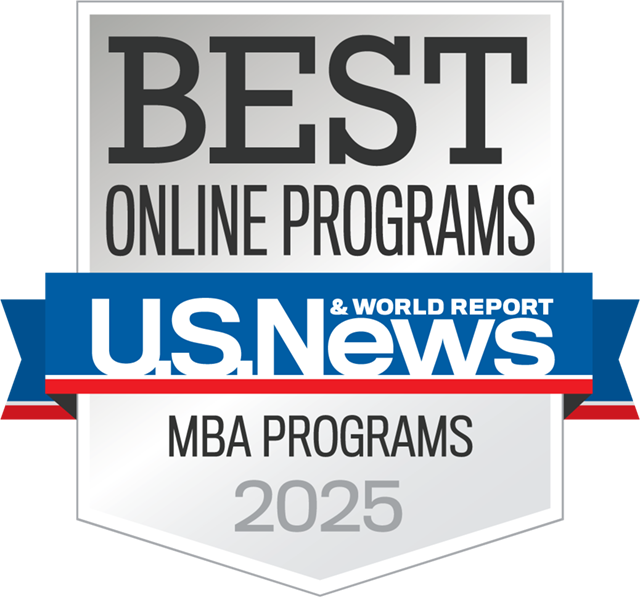100% Online
Complete your Penn State course work at your own pace and 100% online.
Application deadline
Credits and costs
No GRE/GMAT Scores Required
Applicants to the Penn State Online MBA do not need to submit any GRE or GMAT test scores.
Gain Leadership Skills to Manage Teams and Businesses with a Penn State Online MBA
Influence and work effectively on high-performing teams in the business world.
Use business analytics, critical thinking, and problem-solving to influence corporate strategy.
Manage strategically and plan and prepare for the future.
Utilize business intelligence to understand, analyze, and suggest solutions to significant business problems that cross functional areas of operations.
Stand Out from Others by Customizing Your MBA Online Course List

Stand Out from Others by Customizing Your MBA Online Course List
The Penn State Online MBA allows you to customize your program with one of more than 25 concentrations. Few top-tier online MBA programs offer this level of depth. Each concentration gives you three elective courses to complement and supplement what you’ve already learned in your core courses.
This online program is an interdisciplinary, 48-credit degree built around the three-part ICE framework, a teaching and learning approach that incorporates the principles of Integration, Collaboration, and Engagement.
ICE serves as the defining spirit of the Smeal-led Online MBA and shapes the overall design and implementation of its curriculum and your learning experience.
The program strives to unify business concepts across previously siloed business disciplines, which allows you to engage in problem solving from a comprehensive perspective. Every course includes group projects to encourage peer interaction and to build a learning community among the students. These projects simulate real-world business environments, where individuals frequently work in teams to solve problems.
The program includes 39 core credits and 9 credits of concentration course work.
- 3credits
Integrating multiple functional business areas to resolve global business problems and improve organizational performance.
- 3credits
An overview of concepts, applications, and research on group and team processes and performance in an organizational context.
- Note
This course is offered as part of our three-day Team Performance Immersion component required of all Online MBA students.
- 3credits
Accounting rules, practices, and applications that characterize the accounting presentations that for-profit organizations provide to the public.
- 3credits
Introduction to microeconomic and macroeconomic environments of business, pricing determination, market structures, and formulation of competitive strategy.
- 3credits
Applying statistical concepts to quantify uncertainty and gain insights from data in business settings.
- 3credits
Developing communication skills required for managers and leaders; creating effective individual and group presentations.
- 3credits
Managing ethical conduct in organizations, including corporate social responsibility, sustainability, and stakeholder analysis.
- 3credits
Overview of human behavior in organizations, and implications for managing and leading individuals, teams, and organizations.
- 3credits
Application of techniques available to aid managers in sound financial decision making.
- 3credits
Examining strategic issues in marketing, including analysis, planning, and implementation.
- 3credits
Analyzing and applying key concepts, tools, and strategies in managing supply chains in global markets.
- 3credits
How digital innovation, technology, and market disruption transforms industries, business practices, and market strategies.
- 3credits
Understanding, exploring, and applying innovation-related concepts, principles, and practices to corporate environments involved with new venture creation and other contexts.
Concentration Courses
- Accounting Foundations
- Additive Manufacturing and Design
- Advanced Accounting
- Business Analytics
- Business Architecture
- Business Sustainability Strategy
- Business-to-Business Marketing
- Community and Economic Development
- Corporate Innovation and Entrepreneurship
- Cybersecurity Intelligence Leadership
- Diversity and Inclusion as Strategy
- Engineering Leadership and Innovation Management
- Finance
- Financial Engineering
- General Management
- Health Care Business
- Homeland Security
- International Affairs
- Leadership and Talent Management
- Management Consulting
- Marketing Analytics
- Negotiation and Influence
- Project Management
- Public Administration
- Real Estate Law and Valuation
- Strategic Leadership
- Supply Chain Management
- Supply Chain Risk Management
- Taxation
Many concentrations require program prerequisites from the above core MBA courses. Please consult with your adviser to determine the course sequence that is most appropriate for your plan of study.
- 3credits
Introduction to U.S. federal income tax, covering the basics of taxation of individuals, corporations, flow-through entities, and property transactions.
- 3credits
Principles of the risk-based approach to the audit of financial statements, with special focus on financial information systems.
- 3credits
Examination of the internal organizational accounting procedures that establish accountability within organizations.
- 2credits
This course explores the legal rules related to the ownership, enforcement and management of information related to additive manufacturing.
- 4credits
Comprehensive study of the fundamentals, process characteristics, economics, and practical applications of various additive manufacturing processes.
- 4credits
Focuses on the state of the art in understanding processing, structure, and property relationships in materials fabricated using additive manufacturing.
- 3credits
Auditing theory pertaining to the regulatory environment, risk assessment, internal controls, materiality, computerization, analytical procedures, sampling, fraud, ethics, and professional responsibilities.
- 3credits
Tax theory pertaining to corporations, partnerships and conduit entities, estates, trusts, ethics, and professional tax responsibilities.
- 3credits
The study of business processes, transactions cycles, and internal control structure with an emphasis on computerized accounting information systems.
- 3credits
Current managerial accounting topics such as activity-based costing, theory of constraints, and performance measures and their use in organizations.
- 3credits
The study of ethical systems and ethical decision-making and their application in accounting.
- 3credits
The exploration of conventional and advanced methods of analyzing financial statements, including earnings quality and financial distress assessment.
- 3credits
Accounting theory and practice for reporting consolidations, foreign currency transactions, and preparing financial statements for governmental and NGOs.
- 3credits
Accounting, reporting, and auditing principles and procedures for public sector agencies and nonprofit organizations.
- 3credits
Explores the use of descriptive analytics concepts, tools, and techniques throughout a wide range of business scenarios and problems.
- 3credits
Explores the use of predictive analytics tools and techniques throughout a wide range of business scenarios and problems; includes a subset of methods such as neural networks, machine learning, social media analytics, and more.
- Prerequisite
BAN 830
- 3credits
Development of methods for prescriptive analytics with a focus on business supply side decisions and risk mitigation.
- Prerequisite
BAN 830
- 3credits
Focuses on the development and application of business architecture as a holistic discipline that produces a common understanding of the organization that is used to align strategic objectives and tactical initiatives.
- 3credits
Explores the use and effectiveness of architectural modeling to describe an organization and examines model-based products as tools to support, influence, and enable organization planning and decision-making.
- Prerequisite
BA 809
- 3credits
Surveys emerging trends and disruptors in technology and industry that create new markets and influence decision-making, product development, business models, and business practices associated with innovation.
- 3credits
Emphasizes identity issues that are critical to understanding individual and collective processes in organizational life.
- or:3credits
Addresses the managerial challenge of strategy implementation, particularly by examining the organizational elements that must be drawn into line to support a strategy, as well as the immense difficulties of changing an organization. Relies on two overarching frameworks: a model of organizational alignment and a model for managing the change process.
- 3credits
An overview of the economic, social, and environmental drivers of the transformation to sustainable business models and practices; identification of best practices and frameworks for assessing organizational engagement with sustainability; development of a strategic sustainability plan.
- 3credits
Introduction to new business models and sustainable design principles for reinventing products and services to drive business value while reducing environmental and social impact, sourcing raw materials and working effectively with suppliers to safeguard labor and human rights and protect and restore natural resources, and managing total cost and risk. Special focus on circular economy strategies and closed loop supply chains.
- 3credits
Provides an overview of how to successfully use data and analytics to evaluate target segments, brand management, product development, and pricing strategies to drive success.
- 3credits
Explores state-of-the-art insights into innovation strategy, product development processes, and new product introduction and management in B2B.
- 3credits
Focuses on B2B marketing strategy, offering a framework for value creation and delivery and introducing key concepts, theories, and strategic decision-making in business-to-business markets.
- 3credits
Concepts, strategies, and techniques of local economic analysis, planning, and development; decision-making exercises.
- Prerequisite
an introductory course in economics
- 3credits
Understanding theories, concepts, and frameworks of community and economic development and community decision-making models in application to community development practice and issues.
- 3credits
Exploration, understanding, and application of leadership roles, strategies, and principles in group and community settings.
- 3credits
Understanding the interaction of population characteristics, land use, municipal funds, and taxation in a locality and how they impact the operation and management of government jurisdictions.
- 3credits
This course is an overview of the field of planning. It examines the history of planning and the theories behind it, and the corresponding roles that planners can play in their communities. It establishes the legal framework for planning as a profession, and examines landmark legal cases involving planning and its tools.
- 3credits
Understanding and applying methods and hands-on experience with techniques used in community and economic development.
- 3credits
Understanding connections between communities and surrounding ecosystems; exploration of management techniques for building adaptive, resilient, and sustainable communities and environments.
- Prerequisite
Please contact the CEDEV program manager and academic adviser at [email protected].
- 3credits
Entrepreneurship in the Community, empirically and conceptually examines the relationship between entrepreneurs, small businesses, and local economic development. The course examines the multiple definitions of "entrepreneurship," and how these individuals affect — and are affected by — the social and economic dynamics of their community. The course develops a rich understanding of the entrepreneurship process from a community-based view rather than a traditional firm-based view, illustrating the many ways that entrepreneurs and their local society interact. The course begins by examining the role of the firm in society, and the ways that local life enhances and contains opportunity and opportunistic action. Students will also learn ways to measure small business dynamics locally, and develop an understanding of how different community development approaches may affect different types of entrepreneurship
- Prerequisite
CEDEV 430
- 3credits
Launching ideas from socially and environmentally conscious for-profit businesses, to nonprofits, to spin-offs of existing models.
- Prerequisite
CEDEV 430
- 3credits
Provides a strong foundation in theories and concepts of international development that inform practice. Addresses issues of how economic growth and disparity are spatially distributed, differentiated, and what causes these patterns to occur.
- 3credits
Focuses on the process of launching a new venture, in a corporate setting or as a new start-up, including identifying a problem or market opportunity, developing business models, forming a team, financing, analyzing markets, assessing the competitive environment, and planning to acquire leadership talent.
- 3credits
Surveys emerging trends and disruptors in technology and industry that create new markets and influence decision-making, product development, business models, and business practices associated with innovation.
- 3credits
Explores the methods used to foster innovation and entrepreneurship in a corporate setting, with a special emphasis on how organizations foster creativity, innovation, and new venture creation.
- 3credits
A comprehensive overview of the various ways to finance a company, develop valuation models, and present investment recommendations of evaluated companies utilizing the Garber Venture Capital Fund.
- 3credits
Contemporary security issues; security management processes, architecture, and models; risk analysis and management; security planning, analysis, and safeguards; security policies development and administration; contingency planning, incidence handling, and response; and security standards and certification processes.
- 3credits
Legal environment of information technology, constitutional/political issues, intellectual property, management, e-commerce, privacy, access, computer contracting, cyberspace regulation.
- Prerequisite
IST 301 or SRA 231
- 3credits
Essential skills and knowledge for effectively utilizing networks and internet technologies to facilitate, manage, and secure data communications and applications.
- 3credits
This graduate course improves understanding in an organizational setting of the principles and practices of cyber forensics as well as the management of information security.
- 3credits
This course provides theoretical and applied foundations of information security and assurance.
- 3credits
This course provides an overview of techniques to assess and ensure the security of web applications and services that drive modern e-commerce transactions.
- 3credits
This course provides students with the principles of project management and knowledge of the project management skills and processes needed to select, initiate, and plan a project.
- 3credits
This course covers the fundamental principles, methods, and tools of visual analytics that enable data and security analysts to synthesize information and derive insight from data. Visual analytics represents a human-centered approach in designing interactive data visualizations and dashboards that enables full cycles of data analysis, from making sense of data, assessing situations, detecting unexpected patterns, as well as communicating findings and informing actions.
- Prerequisite
IST 816 or IST 554
- 2credits
This course starts with the reality that the United States is less influential in global trade, finance, economics, and business than it was in previous decades.
- 1credit
Designed around a visit to another economic region. Students visit both local and multinational businesses to understand how a business gets established and run in another country; students also meet with industry and government officials to get their perspectives on the economic policies of the country.
- Note
Additional fee applies for travel
- 3credits
Addresses the managerial challenge of strategy implementation, particularly by examining the organizational elements that must be drawn into line to support a strategy, as well as the immense difficulties of changing an organization. Relies on two overarching frameworks: a model of organizational alignment and a model for managing the change process.
- 3credits
Emphasizes how leading across differences and leveraging a diverse workforce is a core leadership competency in organizations today.
- 3credits
Covers the essential concepts and skills needed to make effective contributions on projects, on time and within budget.
- 3credits
Explores cultural differences and impact on business practices and team dynamics working on virtual project teams with global partner universities.
- 3credits
Develop competencies for leading new product/process development or participating in corporate spinouts using entrepreneurial skills within a corporation.
- 3credits
The course is designed to expand the student's knowledge of the broad field of financial and investment analysis.
- 3credits
Analysis of the international aspects of managerial finance. Emphasis on the environmental and institutional factors influencing capital acquisition and allocation.
- 3credits
Analysis of factors affecting price determination in financial markets.
- 3credits
Introduces the student to the major derivative securities that are the tools in the management of financial risk: futures, forwards, swaps, and options. The course will expose students to potential critiques of traditional financial theory based on recent empirical results, including the global financial crisis of 2007–2009.
- 3credits
Aims to develop the basic econometric estimation and hypothesis testing tools necessary to analyze and interpret the empirical relevance of financial and other economic data; focuses on the theoretical foundations of econometric analysis and strategies for applying these basic econometric methods in empirical finance research.
- 3credits
Focuses primarily on developing spreadsheet applications and using the case method to apply decision-making procedures to real-world problems in finance areas; exposes students to topics such as financial ratio analysis, financial forecast, regression analysis, portfolio management, asset valuation, risk management, and more.
General Management (select 9 credits)
Students pursuing the General Management concentration may select from a list of more than 20 online courses in consultation with their academic adviser. For an updated list of courses, please contact [email protected].
Health Care Business (9 credits)
Students in the Health Care Business Concentration must have an undergraduate degree in health administration or health management program and/or experience working full-time in health care for at least three years. Admission to the online MBA program is not a guarantee of approval to enter the Health Care Business concentration.
- 3credits
Introduction to health systems, health services organization, and health care delivery focused on trends, problems, and issues.
- 3credits
Survey of the application of economics to the roles of markets and government in health care.
- 3credits
The financial environment of health institutions; financial aspects of management decision-making; emphasis on revenue sources, budgeting, and cost control.
- 3credits
Explores psychological impact of disasters and terrorist attacks on victims, families, rescuers, and society and methods of reducing negative effects.
- 3credits
The homeland security framework depends on strategic planning and organization. This course examines the key issues associated with these.
- 3credits
Fundamentals of Homeland Security provides foundational knowledge about homeland security policy, strategy, organization, and legal issues in the U.S. context.
- 3credits
Analyzes, evaluates, and critiques homeland security plans in practice.
- 3credits
Examination of the roles of the public and private sectors and the military in preparing for, mitigating, and responding to disasters.
- 3credits
Address the central tenets of diplomacy and international relations and theories and concepts that underpin the study of international relations.
- 3credits
Examine how governments gather intelligence, how intelligence is analyzed, and what impact it has on policymakers.
- 3credits
Continuing seminars that consist of series of individual lectures by faculty, students, or outside speakers. Introduces students to quantitative methods applicable to various issue areas, including international relations, economics, business, law, education, health, and environment.
- 3credits
Provides students with a conceptual understanding of careers/career design making through an examination/discussion of the literature in career management.
- Prerequisite
MGMT 501
- 3credits
This course develops students’ process modeling, data analytics, and decision-making skills regarding the management of people in an organization. Analytics includes data collection, organization, storage, analysis, and all the tools and techniques used to describe current processes, assess and address challenges, and plan for changes.
- 3credits
Development of behavioral skills associated with outstanding leadership of individuals, teams, and organizations through advanced information technology, experimental exercises, and case analysis.
- 3credits
Analysis and application of models, theories, and strategies for managing an increasingly diverse workforce and customer base.
- 3credits
Exploration of positive organizational behavior and wellbeing concepts for developing the "human sustainability" factor in organizations.
- 3credits
The primary purpose of this course is to provide students with an overview of current theory and practice in organizational change and development.
- 3credits
Investigate how managers might identify, engage in, and evaluate effective human resources practices; roles and practices of the HR professional will be examined.
Management Consulting (9 credits)
Three credits will be selected from a pre-determined list maintained by the program. Please contact the program for course options at [email protected].
- 3credits
Provides an understanding of key issues, concepts, and methodologies associated with business transformation and management consulting; helps students identify and define organization problems, highlight pain points, map workflows, explore business models, investigate strategic alignment, develop recommendations, present business cases, and deliver prototype solutions.
- 3credits
Explores the methods and tools commonly used in the practice of management consulting and is intended for students interested in working in this field or working in organizations that hire management consultants.
- 3credits
Introduction to data analytics for evaluating digital marketing communication, including assessment of mobile, website, and online shopper experiences; evaluation of digital campaigns, social media monitoring, and media mix modeling.
- 3credits
Examination of data analytics to strategically drive targeting, acquiring, developing relationships with, and retaining customers.
- 3credits
Use of marketing data and analytics to drive brand, product, and customer experience performance.
- 3credits
Delivers an overview of the difference between traditional (distributive) bargaining and interest-based (or integrative) negotiations; learn to identify their own and others' interests, to create and claim value, and to craft constructive agreements for all parties.
- 3credits
Aims to provide students with a toolkit that will allow them to diagnose individual and organizational source of power and influence as well as an array of tactics by which power and influence are wielded.
- 3credits
Introduces the theory and practice of negotiation in a variety of settings, with specific emphasis on multiparty context; the course will allow students to develop these skills experientially and to understand negotiation in useful analytical frameworks.
- Prerequisite
BA 805
- 3credits
A problem-based, interdisciplinary course in project management skills and techniques needed to manage projects in a modern business environment.
- 3credits
A problem-based course that emphasizes project cost control and teaches students to apply techniques to control projects in business.
- 3credits
A problem-based course that addresses techniques for planning the project development process, including securing resources and resource management.
- 3credits
Formal courses given on a topical or special interest subject which may be offered infrequently.
- Note
Only MANGT 597: Project Risk Management satisfies this course requirement.
- 3credits
Nature, function, and technique of governmental budgeting viewed as mechanism for allocating resources among alternative public uses.
- Prerequisite
PADM 500
- 3credits
Introduction to the analysis of public policy within its organizational and political contexts, including an emphasis on an economic perspective.
- 3credits
Development of basic concepts and issues in public administration; administrative theory and public policy processes.
- 1credit
Provides an overview of real estate evaluation and risk analysis, property rights and regulations, and financial real estate evaluation.
- 2credits
Covers principles, strategies, and techniques of negotiation with multiple parties involved in commercial real estate transactions, along with how to create financially viable agreements.
- 3credits
Explores economic theories of valuation applied to real estate as a guide to business decisions. Also covers understanding of real estate value, how to measure it, and its application to the real estate marketplace.
- 3credits
Analyzes contemporary law applicable to various types of ownership interests and rights, methods of transferring ownership, and use of real property.
- 3credits
Presents a senior executive perspective on the key opportunities and challenges faced by business leaders; includes discussions on the changing context for setting strategy and leading organizations in an evolving business environment.
- 3credits
Emphasizes identity issues that are critical to understanding individual and collective processes in organizational life.
- 3credits
Addresses the managerial challenge of strategy implementation, particularly by examining the organizational elements that must be drawn into line to support a strategy, as well as the immense difficulties of changing an organization. Relies on two overarching frameworks: a model of organizational alignment and a model for managing the change process.
- 3credits
Performance metrics used in supply chain management, both within the enterprise and across the extended enterprise.
- Prerequisite or concurrent
SCM 800
- 3credits
Selecting, evaluating, and determining the nature of relationships with suppliers from the buyer's perspective within the context of industry and market knowledge. Additionally, understanding ethical conduct in business organizations.
- Prerequisite
SCM 800
- 3credits
Best principles and practices for production management as well as tools and models for demand forecasting and inventory management, particularly as it relates to the fulfillment of demand for finished goods.
- 3credits
Studies foundations of cybersecurity and the threats it aims to prevent.
- 3credits
This course examines the fundamental elements of crisis, disaster, risk, and emergency management.
IST 803 should be taken prior to IST 564.
- 3credits
Explores how to identify, assess, and implement strategies and tactics for managing supply chain risk by building and maintaining resiliency in the supply chain.
- Prerequisite
SCM 800
- 3credits
Introduction to U.S. federal income tax, covering the basics of taxation of individuals, corporations, flow-through entities, and property transactions.
- 3credits
Focuses on the tax law treatment of corporate formations, operations, distributions, mergers, and acquisitions, as well as accounting for income taxes.
- 3credits
Provides a survey of the law defining the taxation of pass-through entities including partnerships, S-corporations, limited liability companies, and trusts.
- 1.5credits
Explores the U.S. federal income tax system as applicable to international taxation and its effects on individual and organizational decision-making; students gain the knowledge to evaluate legal jurisdiction, residency, and income sourcing, along with planning to optimize transfer pricing and income deferral.
- 1.5credits
Provides students with an understanding of state and local taxation, including personal and corporate income tax, sales and use tax, and legal limitations to taxation.
Optional Global Immersion Experience
This learning experience is designed to enhance your ability to communicate cross-culturally, adapt to evolving business environments, and manage some of the key risks and benefits of operating on a global scale. The Global Immersion trip may include visits to corporate headquarters and manufacturing facilities, as well as meetings with executives and government officials to learn about international business from those experiencing it firsthand in the country you are visiting.
The Global Immersion trip and corresponding course(s) will be offered each spring. Please note that course work is required both before and after the trip. Online students may pursue the Global Immersion experience/courses in one of two ways:
- Option 1: Take BA 836 for 1 credit during spring semester. The 1-credit course will include the trip and associated pre/post-work. BA 836 would be an additional credit on top of the 48 required to graduate.
- Option 2: Take BA 836 for 1 credit AND BA 835 for 2 credits during spring semester. Together, the 3 credits will involve more extensive course work in this subject area and will include the trip. The 3 combined credits for BA 835 and BA 836 count as one 3-credit elective course in the General Management concentration or the Diversity and Inclusion as Strategy concentration. Please contact the program office with any questions.
We aim to have enough students across programs to allow students to choose from 3–4 locations each spring. Past trips for the full-time and executive students have included Johannesburg, South Africa; Shanghai, China; Prague, Czech Republic; and Santiago, Chile. The trip choices will be made by the program faculty directors based on global business climate and corporate and alumni relationships that will allow for the most fruitful experience. Please contact the program office for more details, including fee structure, upcoming dates, and locations. Please note that students pay course tuition as well as an additional trip fee to participate in the Global Immersion experience.
Course Availability
If you're ready to see when your courses will be offered, visit our public LionPATH course search (opens in new window) to start planning ahead.
Start or Advance Your Career

Start or Advance Your Career
You can use the knowledge gained from this program and the support of Penn State career resources to pursue careers in a variety of fields, depending on your goals.
Job Titles Related to This Degree
The following roles are often held by people with this type of degree:
- Chief Executive Officer (CEO)
- Executive Director
- General Manager (GM)
- Management Consultant
- Operations Director
Employment Outlook for Occupational Fields Related to This Degree
Estimates of employment growth and total employment are provided by the U.S. Bureau of Labor Statistics and are subject to change. While these occupations are often pursued by graduates with this degree, individual outcomes may vary depending on a variety of factors. Penn State World Campus cannot guarantee employment in a given occupation.
General and Operations Managers
Management Analysts
Chief Executives
Special Online MBA Career Services
Whether you wish to advance in your current position or begin a new career path, you should consider the available networking opportunities and career resources when selecting your MBA program.
The Online MBA program utilizes multiple career resources from across the University, including assistance from Penn State World Campus, Smeal College of Business, and the Penn State Alumni Association.
As an Online MBA student, you will work one-on-one with a career coach to establish a customized roadmap based on your goals. You can also take advantage of the following:
- self-assessments such as Myers-Briggs Type Indicator and Career Leader
- tools for job seekers, including LinkedIn profile services, cover letter review, résumé review, interview preparation, and job search strategy planning
- access to job postings and career fairs (online and on-campus)
- career-focused webinars
All of our career resources have been carefully tailored to meet the diverse needs of our online learners.
Upon graduation, Penn State Alumni Career Services will allow you continued access to many of the resources you had as an Online MBA student, which you can utilize as needed throughout your career.
Connect with Smeal
In addition to World Campus–provided career services and tools, Online MBA students who complete a prescribed plan of career preparation will also gain access to Smeal-specific job postings through the Nittany Lion Careers job posting system, access to Smeal career fairs, and information about additional activities and events for Smeal students and alumni.
Penn State Alumni Association
Penn State is home to the largest dues-paying alumni association of its kind in the world — and one of the most powerful networks. Numbering more than 750,000 graduates, Penn State alumni live and work in every county in Pennsylvania, every state in the United States, and in numerous countries around the world.
Chapters are created by Penn State alumni and friends in most major metropolitan areas, to allow graduates the opportunity to network professionally and celebrate the strong bond associated with being a proud Penn Stater.
On-Demand Webinar
Our on-demand Online MBA Webinar can provide you additional insight into the curriculum if you are unable to attend our upcoming events.
Ready to Learn More?
Get the resources you need to make informed decisions about your education. Request information on this program and other programs of interest by completing this form.
Ready to take the next step toward your Penn State master's degree?
Costs and Financial Aid
Costs and Financial Aid
Learn about this program's tuition, fees, scholarship opportunities, grants, payment options, and military benefits.
Graduate Tuition
Graduate tuition is calculated based on the number of credits for which you register. Tuition is due shortly after each semester begins and rates are assessed every semester of enrollment.
2024–25 Academic Year Rates
| How many credits do you plan to take per semester? | Cost |
|---|---|
| 11 or fewer | $1,260 per credit |
| 12 or more | $15,130 per semester |
2025–26 Academic Year Rates
| How many credits do you plan to take per semester? | Cost |
|---|---|
| 11 or fewer | $1,273 per credit |
| 12 or more | $15,281 per semester |
*If you are planning to take 12 or more credits in one semester, you must first schedule a consultation with your academic advisor and the program's faculty chair.
Paying for Your MBA Education
Penn State offers many ways to pay for your education, including an installment plan and third-party payments. Additionally, World Campus offers an Employer Reimbursement and Tuition Deferment program. Please visit the Paying Your Semester Bill page of our student website for more details.
Financial Aid and Military Benefits
Some students may qualify for financial aid. Take the time to research financial aid, scholarships, and payment options as you prepare to apply. Federal financial aid may only be used to pay for credits used to satisfy program requirements.
Military service members, veterans, and their spouses or dependents should explore these potential military education benefits and financial aid opportunities, as well.
Additional Cost of Attendance Details
To view the detailed list of cost of attendance elements:
- visit the Tuition Information site
- click the plus sign to expand the table
- select a semester from the World Campus row
Technical Requirements
Review the technical requirements for this program.
A computer is required for this program. You must have administrator rights on the machine that enable you to install new software. While our core courses are designed to operate using either Windows or iOS, concentration courses may require software that is compatible only with Windows. Please contact the program office at [email protected] for more information about specific concentration requirements.
Benefit from Partnering with Smeal College of Business

Benefit from Partnering with Smeal College of Business
Selecting an MBA program is about more than earning a degree — it's about making lifelong personal and professional connections.
With the support of Penn State Smeal, you can receive:
- specialized career coaching
- personal advising
- access to global immersion trips
- additional networking opportunities
More options, greater flexibility, and a commitment to lifelong learning
The desire for knowledge and professional growth spans a lifetime. That is why the Penn State Smeal College of Business offers a portfolio of professional graduate programs for all stages of your career. In partnership with Penn State World Campus, Smeal makes it easy to customize a learning plan to your unique career aspirations and busy schedule. Penn State Smeal offers you a lifetime of learning with more concentrations and one of the most integrated, flexible offerings of online and residential programs in the United States.

An entire team dedicated to your success
Personal advising — Our experts will explain the many options that Penn State Smeal offers and will help you refine your career strategy and craft the educational experience best suited to your interests. It all starts with a simple, but critical question: “What are your goals?”
Career coaching* — Our Alumni Career Services team will support you across all career stages with professional advancement opportunities and coaching to help you stay focused on achieving your goals.
Delivering the best of online and in-person learning for a rich educational experience
We understand that today’s professional learners want meaningful discussion and interaction with faculty and classmates along with the technologies and flexible approaches of contemporary online learning. By aligning the best of both worlds, we bring richness, depth, and diversity to the overall educational experience.
Courses designed to engage and motivate the professional student
Creative Teams consisting of a lead faculty member, a Teaching Support Specialist (TSS), and an Instructional Designer use advanced analytics to develop and deliver contemporary graduate courses that promote application and engagement. We strive to innovate in ways that others don’t.
A real-world perspective
- Industry professionals inside the virtual classroom — Many of Penn State Smeal’s courses feature industry professionals who have been in the trenches and work hard to make an impact every day. These individuals, most of whom hold a Smeal graduate degree, partner with our renowned faculty to provide a rich academic context with real-world application.
- Global immersion* — This unique, optional experience will enhance your ability to communicate cross-culturally, adapt to evolving business environments, and manage the risks and benefits of operating on a global scale. Any student pursing a full degree from Smeal may participate in this optional, faculty-led experience for elective credit. Previous destinations have included Shanghai, China; Johannesburg, South Africa; Prague, Czech Republic; Santiago, Chile; and Zagreb, Croatia.
One of the largest and most influential networks in the country
At Penn State, you are part of a worldwide community of instructors, learners, and more than 775,000 alumni who support one another and make a meaningful impact. Whether studying on campus or online through Penn State World Campus, all Penn State students can experience a sense of community and belonging. You’ll have opportunities to engage with your peers, faculty, and alumni through virtual and in-person, on-campus events such as Impact Smeal Day, WE ARE Weekend, THON™, and the Blue-White game.
More than 94,000 Smeal alumni benefit from connections around the globe as well as networking events, podcasts, webinars, a powerful LinkedIn community, and opportunities for volunteerism.
* Services are available only to students and alumni of Penn State Smeal’s degree programs and online degrees led by Smeal and delivered through the World Campus. Students and alumni of online graduate certificates are not eligible to receive these benefits unless they are also enrolled in a degree program.
Earn a Valuable Credential along the Way

Earn a Valuable Credential along the Way
Show mastery of specific subjects before your degree is complete. Thanks to shared courses across programs, students can often earn a certificate along with their degree in less time than if they earned them separately.
Certificate Programs Related to This Degree
The following certificates can be earned while completing this degree program:
Develop the quantitative and managerial skills needed to analyze complex data sets and support data-driven business decisions. This online program provides a practical approach to deploying analytics in the areas of marketing, supply chain management, operations, and risk management.
Learn more about the Graduate Certificate in Business AnalyticsGain the expertise to align your organization's higher-level strategic objectives with tactical enterprise-level projects and technology initiatives to improve overall effectiveness and efficiency. This program is recognized by the Business Architecture Guild.
Learn more about the Graduate Certificate in Business ArchitectureBuild a strong foundation across a wide range of business disciplines, including management, accounting, finance, leadership, and marketing. This interdisciplinary certificate is ideal for graduate professionals who desire more formal business training or education.
Learn more about the Graduate Certificate in Business Management FoundationsLearn sustainable business practices that can drive environmental, social, and governance (ESG) performance while improving profitability, reducing cost and risk, and building competitive advantage. Prepare to develop and implement a sustainability strategy for any type of organization.
Learn more about the Graduate Certificate in Business Sustainability StrategyPrepare for a rewarding career in B2B marketing in this 9-credit, online business-to-business marketing graduate certificate. You can gain an understanding of essentials including value creation and delivery, B2B marketing strategy, marketing analytics, new product development, and more.
Learn more about the Graduate Certificate in Business-to-Business MarketingBuild the business, leadership, and entrepreneurial skills needed to develop groundbreaking products and services and manage high-performance teams. This online program is ideal for entrepreneurial-minded, creative thinkers who want to understand the principles of innovation and entrepreneurship.
Learn more about the Graduate Certificate in Corporate Innovation and EntrepreneurshipThis online financial engineering certificate can help you apply knowledge of finance, economics, statistics, and data analysis to make sound financial decisions and design innovative financial instruments and risk management strategies.
Learn more about the Graduate Certificate in Financial EngineeringGain the knowledge and skills required to succeed as an independent management consultant, member of a consulting firm, or in-house advisor in a corporate or public sector setting with this online graduate certificate program in management consulting.
Learn more about the Graduate Certificate in Management ConsultingGain the core knowledge necessary to make data-driven marketing decisions. This online certificate program is ideal for marketing professionals and market researchers who wish to become more data-savvy and use digital analytics to strategically support a business.
Learn more about the Graduate Certificate in Marketing AnalyticsAcquire the skills you need to gain support for your ideas, influence the outcome of negotiations, and successfully implement your solutions. This program can help you learn to identify personal interests and gives you the opportunity to practice strategies though multi-party negotiation scenarios.
Learn more about the Graduate Certificate in Negotiation and InfluencePrepare to succeed in a variety of positions related to the competitive and rewarding commercial real estate market. In this online program, finance, business, and legal professionals can further specialize their skills and/or practice to find success working in the growing commercial real estate industry.
Learn more about the Graduate Certificate in Real Estate Law and ValuationExplore the challenges that managers face when implementing corporate strategy and learn to shape organizational cultures that facilitate change with this online graduate certificate program in strategic leadership.
Learn more about the Graduate Certificate in Strategic LeadershipLearn to create a more secure supply chain using industry-proven strategies for managing interruptions as well as tactics for mitigating risks.
Learn more about the Graduate Certificate in Supply Chain Risk Management100% Online Team Performance Immersion Experience

100% Online Team Performance Immersion Experience
During the required virtual Team Performance Immersion, you will connect with your colleagues and immerse yourself in the first core course in the program, team performance. The three-day immersion experience is 100% online and the only time we will require you to be present for synchronous sessions during the day.
Integration, Collaboration, and Engagement
A defining component of the program is the required Online MBA Team Performance Immersion, which takes place at the start of the program. Designed to provide information, introduce resources, and foster valuable interactions with faculty and student peers, the immersion helps to prepare students for a successful, integrative, collaborative, and engaging online learning experience.
During the experience, you will be immersed in a team performance class; review key program components, including a core course overview and an introduction to the concentrations; and receive technical training on systems you will use as a student.
100% Virtual Format
Students will participate in a required three-day 100% virtual team performance immersion experience. There will be optional opportunities to visit campus throughout the course of the program, but they will never be required.
| Semester of Matriculation | Immersion Dates |
|---|---|
| Summer 2025 | May 13–15, 2025 |
| Fall 2025 | August 19–21, 2025 |
| Spring 2026 | January 6–8, 2026 |
| Summer 2026 | May 12–14, 2026 |
| Fall 2026 | August 18–20, 2026 |
| Spring 2027 | January 12–14, 2027 |
| Summer 2027 | May 11–13, 2027 |
| Fall 2027 | August 17–19, 2027 |
AACSB Accredited

The Penn State Smeal College of Business is AACSB accredited, an honor reserved for the top 5% of business schools worldwide. This program is competitively priced compared to other AACSB–accredited programs.
Frequently Asked Questions
Frequently Asked Questions
You can learn more about the application process, team performance immersion, and what our courses are like right now.
How many hours a week should I plan to allocate per course?
Most MBA courses are three credits. Penn State dictates that each three-credit course requires approximately 10 hours of work each week on the part of the student. The amount of hours spent each week may vary, depending on your learning style, speed, and aptitude. You should not expect the rigor of the Online MBA to be any less than an MBA earned on campus.
As an applicant with an international transcript that requires credential review, which organization should I use?
The J. Jeffrey and Ann Marie Fox Graduate School at Penn State will not review the academic credentials of a prospective student until an application is officially submitted. If you feel strongly about having your credentials verified before completing and submitting your application, you may have your credentials reviewed by Educational Credential Evaluators (ECE). Approval from ECE will assure you are academically eligible for not only our program but most other U.S. Institutions as well. Please note the Penn State Fox Graduate School does not accept credential reviews from World Education Services (WES); only reviews done by ECE.
As an international applicant, how do I know if I’m eligible for admission?
To view the admission Eligibility requirements from a selected country, visit the Fox Graduate School's "Requirements for Graduate Admission" page. If you have questions about acceptable official transcripts, visit the Fox Graduate School’s “Transcripts/Records Frequently Asked Questions” page.
If I have a lower than average GPA, will I still be considered? How do I demonstrate my ability to succeed in the program?
We will use other parts of your application to assess your overall potential for success in the program, with a particular focus on the quantity and quality of your professional work experience. Additionally, if you have had any subsequent graduate-level classes (especially those of a quantitative nature), we will consider those in our overall evaluation of your application.
Why is the team performance immersion required?
The team performance immersion is required, as about 25% of the core team performance course (MBADM 810) is taught during this virtual session. Participating in the immersion is essential to connect students with faculty, staff, peers, and resources, which will set them up for success throughout their course of MBA study. While the program is very flexible, it is crucial everyone starts with the same foundational programming.
Is financial aid available?
Many online learners also discover that their employer will subsidize a portion of the tuition as part of an employee’s total benefits package. Flexible payment plan options are also available. Please contact us at [email protected] to discuss your options.
Can I earn another Penn State master’s degree while pursuing my Online MBA?
Absolutely! We have many students ask about pursuing a second degree or certificate concurrently. Most online MBA program concentrations are structured so that they not only serve as MBA electives, but also serve as part of a certificate program, and for some, a full master’s program as well. Depending on your career goals, you may be able to complete a second course of degree study (or add an extra class or two and receive a certificate) concurrently with the MBA with significantly less investment in time and finances than would be required if you completed the courses of study separately. You may also be able to pursue a concurrent degree in academic areas outside of what is offered via the Online MBA concentrations.
If you wish to pursue a concurrent degree or certificate, please contact the Penn State Online MBA’s Managing Director, Stacey Dorang Peeler, at [email protected].
What exactly is the ICE learning methodology?
What will my diploma say?
Your diploma will display The Pennsylvania State University, Master of Business Administration. Neither your degree nor your transcripts will indicate that the degree was earned online.
Set Your Own Pace

Set Your Own Pace
Whether you are looking to finish your program as quickly as possible or balance your studies with your busy life, Penn State World Campus can help you achieve your education goals. Many students take one or two courses per semester.
Our online courses typically follow a 12- to 15-week semester cycle, and there are three semesters per year (spring, summer, and fall). The majority of students finish the program in 2–5 years.
Convenient Online Format
This program's convenient online format gives you the flexibility you need to study around your busy schedule. You can skip the lengthy commute without sacrificing the quality of your education and prepare yourself for more rewarding career opportunities without leaving your home.
A Trusted Leader in Online Education

Penn State has a history of more than 100 years of distance education, and World Campus has been a leader in online learning for more than two decades. Our online learning environment offers the same quality education that our students experience on campus.
Information for Military and Veterans

Are you a member of the military, a veteran, or a military spouse? Please visit our military website for additional information regarding financial aid, transfer credits, and application instructions.
How to Apply to Penn State

How to Apply to Penn State
Apply by November 1 to start January 12
Application Instructions
Deadlines and Important Dates
We strongly encourage applicants to aim for the posted deadlines for the best chance of securing a spot in their intake of choice. We will, however, continue to review applications and admit candidates on a rolling basis after the deadlines, as long as space is available.
Spring Deadline
Apply by November 1 to start January 12Summer Deadline
Apply by March 15, 2026, to start May 12, 2026
Applicants are encouraged to submit all portfolio items as early as possible. Please review the dates of your preferred starting semester's required team performance immersion to ensure your availability.
Steps to Apply
For admission to the Fox Graduate School, an applicant must hold either (1) a baccalaureate degree from a regionally accredited U.S. institution or (2) a tertiary (postsecondary) degree that is deemed comparable to a four-year bachelor's degree from a regionally accredited U.S. institution. This degree must be from an officially recognized degree-granting institution in the country in which it operates.
Our Typical Student
Penn State Online MBA students come from a variety of backgrounds. If you're curious what types of qualifications our applicants usually have, take a look at these student body profile statistics (numbers are averages):
- Work Experience: 7–10 years post-undergraduate full-time work experience
- Undergraduate Cumulative GPA: 3.3
- Percentage of Women: 34%
- Percentage of Military and Veteran: 20%
- States Represented: 30+
- Admissions Requirements
The Penn State Online MBA is suitable for individuals of diverse academic and professional backgrounds and requires no prerequisite course work. However, previous course work in accounting, economics, math, and statistics, or knowledge of these subjects gained through work experience, adds to the strength of your application portfolio. A minimum of two years of professional experience is strongly preferred, with emphasis on post-undergraduate, full-time work experience. Internships and other experiences will be considered holistically but are not considered as part of the work experience minimum recommendation. Course success will rely heavily on the ability to apply real-world experience to academic concepts and teamwork.
Applications are submitted electronically and include a nonrefundable application fee. Applicants who are U.S. military (active duty or veteran) qualify for an application fee waiver. Please contact us, noting branch of service, at [email protected] to request the code. You will need to upload the following items as part of your application:
Official transcripts from each institution attended, regardless of the number of credits or semesters completed. Transcripts not in English must be accompanied by a certified translation. If you are a Penn State alum, you do not need to request transcripts for credits earned at Penn State but must list Penn State as part of your academic history.
Test Scores — GRE/GMAT scores are not required and will not be accepted.
English Proficiency — The language of instruction at Penn State is English. With some exceptions, international applicants must take and submit scores for the Test of English as a Foreign Language (TOEFL) or International English Language Testing System (IELTS). Minimum test scores and exceptions are found in the English Proficiency section on the Fox Graduate School's "Requirements for Graduate Admission" page. Visit the TOEFL website for testing information. Penn State's institutional code is 2660.
References (2) — You will need to initiate the process through the online application by entering names, email addresses, and mailing addresses of two professional and/or academic references. If you have professional full-time work experience (highly recommended), professional recommendations are strongly preferred over academic recommendations, with additional preference for one from a current or previous supervisor. Please do not provide references from family members or friends. Upon submission of your application, an email will be sent to each reference requesting they complete a brief online recommendation regarding your commitment for success in an online program. Please inform all recommenders they must submit the form in order for your application to be complete.
Program-Specific Questions/Materials
Résumé — You will upload your résumé (one to two pages) to the online application. A minimum of two years of professional experience is strongly preferred, with emphasis on post-undergraduate, full-time work experience. Internships and other experiences will be considered holistically but are not considered as part of the work experience minimum recommendation.
Essay Response — Submit one document with your answers to short-answer essay questions (50–100 words each) to allow the admissions committee to get to know more about you and to differentiate yourself from the competition. You should respond to all of these prompts:
- What unique contribution can you offer in a team-based, collaborative online MBA program?
- What is the most difficult constructive criticism you ever received and how did you act on it? Please provide a specific example.
- Is there anything else that you’d like us to know that we can’t see anywhere else in your application?
- How do you define grit? Provide a specific example of a time you demonstrated grit.
Online Interview — For the purpose of ensuring a good fit between the program and the student, the committee may want to gather additional information from the applicant not available in the written application materials. An online interview may be requested by the admissions committee on a case-by-case basis.
To begin the online application, you will need a Penn State account.
Create a New Penn State Account
If you have any problems during this process, contact an admissions counselor at [email protected].
Please note: Former Penn State students may not need to complete the admissions application or create a new Penn State account. Please visit our Returning Students page for instructions.
You can begin your online application at any time. Your progress within the online application system will be saved as you go, allowing you to return at any point as you gather additional information and required materials.
- Choose Enrollment Type: "Degree Admission"
- Choose "WORLD CAMPUS" as the campus
Checking Your Status
You can check the status of your application by using the same login information established for the online application form.5. Complete the application.
Admissions Help
If you have questions about the admissions process, contact an admissions counselor at [email protected].
Applicants who are U.S. military (active duty or veteran) qualify for an application fee waiver. Please contact us, noting branch of service, at [email protected] to request the code.
Contact Us

Contact Us
Have questions or want more information? We're happy to talk.
For general questions, contact:
World Campus Admissions Counselors
Phone: 814-863-5386
[email protected]
For questions about the program or your submitted application, contact:
Bayley Brion
Admissions Assistant, Professional Graduate Programs and Online MBA
Penn State Smeal College of Business
Phone: 814-863-0474
[email protected]
Learn from the Best
Learn from the Best
The Penn State online Master of Business Administration, led by Smeal College of Business, operates in partnership with the Black School of Business at Penn State Behrend, Penn State Great Valley School of Graduate Professional Studies, and Penn State Harrisburg School of Business Administration.
Lead Faculty
Janet Duck

Faculty Chair, Online MBA
- DegreePh.D., Workforce Development, Penn State
- DegreeMBA, Lebanon Valley College
- DegreeB.S., Business Administration, Slippery Rock University
Dr. Janet Duck has more than 15 years of teaching, authoring, and designing experience in online graduate environments. She teaches courses in organizational change management, leadership communication, organizational development and intervention, and team performance. Additionally, Dr. Duck serves as the faculty lead for the Professional Graduate Portfolio (PGP) at the Smeal College of Business, where she facilitates data-driven course design for the graduate business population. She has received the Outstanding Faculty award for the iMBA. She has more than 15 years of industry experience in organizational change and development in both domestic and international markets. Dr. Duck's work in online teaching has been highlighted in The New York Times and Delta Sky Magazine.
Program Faculty
John Cameron

- DegreeJ.D., Widener University School of Law
- DegreeLLM, Corporation Law, New York University School of Law
- DegreeMBA, Temple University
- DegreeB.A., University of Pittsburgh
John C. Cameron, associate professor of management and organization, held corporate positions in health care administration and corporate law. He is admitted to practice law in Pennsylvania, Maryland, and New Jersey. Currently he serves as the co-chair of the Pennsylvania Bar Association Health Care Law Committee. Mr. Cameron teaches courses in leadership development, business ethics, bioscience management and negotiations. His research interests are in the areas of corporate governance, bioethics, leadership, and regulatory compliance.
Jamey Darnell

- DegreeDBA, University of Florida
- DegreeMBA, International Management, Thunderbird School of Global Management
- DegreeB.S., International Business (Italian), Pepperdine University
Jamey Darnell is an associate clinical professor in the Management and Organization Department at the Penn State Smeal College of Business. He has more than 20 years of collegiate teaching experience, including (but not limited to) entrepreneurship, strategic management, international management, ethics, and organizational behavior. In addition, he has more than 10 years of higher education administrative experience.
Ashutosh Deshmukh

- DegreePh.D., Accounting, University of Memphis
- DegreeMBA, Finance, University of Alabama
- DegreeDCM, Computer Programming, University of Mumbai
- DegreeB.S., Chemistry, University of Mumbai
- DegreeProfessional Certifications: CPA, ACA, CFE, CMA, CISE
Dr. Ashutosh Deshmukh is a professor of accounting and MIS at Penn State Behrend. He holds certification in public accounting, information systems auditing, management accounting, and fraud examination, and he has served as an expert witness in the U.S. House of Representatives, estimating the potential for fraud, waste, and abuse of grant money awarded over a five-year period by the U.S. EPA. He has published more than 40 papers and presented at more than 50 conferences. He is also the associate editor of the International Journal of Accounting, Auditing, and Performance Evaluation and the author of the book Digital Accounting: The Effects of the Internet and ERP on Accounting.
Chelsea Hammond

- DegreePh.D., Communication Science, University of Connecticut
- DegreeM.L.S., Southern Connecticut State University
- DegreeB.A., English, Philosophy, University of Connecticut
Dr. Chelsea Hammond is an assistant clinical professor of marketing and program director of the online marketing analytics certificate. Prior to joining the Penn State Smeal College of Business, she spent more than a decade in the market research and marketing analytics industry, where she helped the world's most iconic and well-known brands leverage data to drive business success.
Indrit Hoxha

- DegreePh.D., University of Houston
- DegreeM.A., University of Houston
Dr. Indrit Hoxha joined Penn State in fall 2010. He earned his Ph.D. in economics from the University of Houston. His research has been published in multiple journals, including the Journal of Development Economics, Journal of Empirical Finance, Applied Economics, Journal of Real Estate Finance and Economics, Quarterly Review of Economics and Finance, and Global Finance Journal. He has taught many courses, including microeconomics, macroeconomics, money and banking, and financial markets.
William H. A. Johnson

- DegreePh.D., Operations and Strategic Management, Schulich School of Business, York University (Canada)
- DegreeMBA, Operations Management, Schulich School of Business, York University (Canada)
- DegreeB.A., Economics, York University (Canada)
- DegreeB.S., Biological Sciences, McMaster University (Canada)
Dr. William H. A. Johnson is an associate professor of management at Penn State. His research and teaching interests include innovation, strategy, and international management. His research is published in high-quality innovation-based journals including Research Policy, IEEE Transactions on Engineering Management, Technovation, Journal of Business Research, Research-Technology Management, International Journal of Technology Management, Journal of International Management, Journal of Intellectual Capital, Engineering Management Journal, and Entrepreneurship: Theory and Practice, among others. He has authored several practitioner-oriented books on developing a competitive global strategy at Routledge (Managing Global Strategy: Developing an Effective Strategy in International Business), the push toward an innovation economy by the Chinese at BEP (Innovation in China: The Tail of the Dragon) and creating effective project-based strategies, also at BEP (Project Strategy and Strategic Portfolio Management).
David Morand

- DegreePh.D., Organizational Behavior, Cornell University
- DegreeM.A., Industrial and Labor Relations, Indiana University of Pennsylvania
- DegreeB.A., Humanism and Cultural Change, University of Wisconsin
Dr. David Morand is a professor of management at Penn State Harrisburg. He teaches courses in organizational behavior, human resource management, and labor relations. His research interests include power and influence in organizational interaction, formal/informal social environments in organizations, cross-cultural communication, and labor law. His research has been cited prominently in the media, including such business media as the Wall Street Journal, Investor's Business Daily, New York Times, Times of London, Chicago Tribune, Business Week Magazine, and Psychology Today.
Judy Qiu

- DegreePh.D., Finance, University of Queensland Business School, Australia
- DegreeMaster's of Banking and Finance, Griffith University, Australia
- DegreeMaster's of Professional Accounting, Griffith University, Australia
Judy Qiu received her Ph.D. in finance from the University of Queensland Business School in Australia. She holds two postgraduate degrees: a Master’s of Banking and Finance and a Master’s of Professional Accounting, both from Griffith University in Australia. She has more than 10 years of teaching experience, including positions at Ithaca College, the University of Western Australia, and the University of Queensland. Her research interests include mutual fund and hedge fund performance, asset pricing, and corporate finance.
Sourish Sarkar

- DegreePh.D., Industrial and Systems Engineering, Virginia Tech
- DegreeM.S., Industrial and Systems Engineering, Virginia Tech
- DegreeB.E., Mechanical Engineering, Jadavpur University
Dr. Sourish Sarkar is an associate professor of operations and supply chain management. He teaches supply chain management and operations planning (using SAP) for MBA and undergraduate students. Dr. Sarkar’s research interests are inventory and supply chain management and behavioral operations. His research has appeared in the International Journal of Production Economics, International Journal of Production Research, and International Journal of Physical Distribution & Logistics Management.
Sagnika Sen
 DegreePh.D., Arizona State University
DegreePh.D., Arizona State UniversityDr. Sagnika Sen is an associate professor of information systems at Penn State Great Valley. Her research focuses on process performance, metrics, and incentive design in organizations. She has published in top academic journals in the field of information systems, such as Information Systems Research and Journal of Management Information Systems. Dr. Sen teaches courses in management information systems, business process management, and business statistics.
Dale Watson

- DegreePh.D., Business Administration, University of Connecticut
- DegreeM.A., Strategy, U.S. Army War College
- DegreeM.S., Administration, Central Michigan University
- DegreeB.S., Business Management, West Chester University
Dale Watson, Ph.D., Colonel (U.S. Army, Retired), is an assistant teaching professor at the Penn State Harrisburg School of Business. A career Army Aviator and former Chairman of the Department of Command, Leadership, and Management at the United States Army War College, Dr. Watson has served at multiple levels of command, including multinational headquarters assignments overseas. His research interests include multi-team systems, team adaptation, team resiliency, organizational change, and leadership. Dr. Watson blends academic foundations with a practitioner’s view of organizational phenomena to better understand these complex environments.
Suzanne A. Wright

- DegreeMBA, Supply Chain, Penn State
- DegreeB.S., Accounting, Penn State
- DegreeCertified Public Accountant
Suzanne A. Wright enhances her teaching with practical experience in managerial and financial accounting and various areas of supply chain. She thoroughly enjoys teaching Accounting Systems and Control and Intermediate and Advanced Financial Accounting. She has been involved in Smeal Sustainability for twenty years and is past chair of the education group of the Center for the Business of Sustainability. Suzanne taught two summer programs in China and three-week courses on sustainability and technology at Pforzheim University in Germany.
News

















